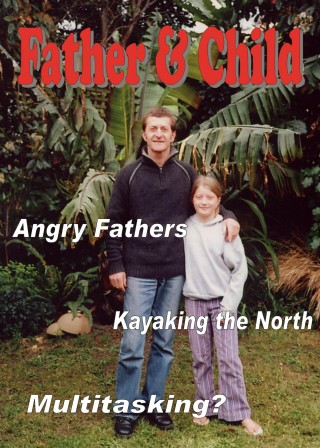Father & Child Magazine Issue #33
Parenting: Discipline; Father Anger Strikes Again; Kayaking with Tracy; Multitasking; The Power of Stories; Opinion: Children Of Imprisonment.
Contents
- Parenting: Discipline
- Father Anger Strikes Again: Law changes are not enough argue a group of dads. They are touring around the country and demonstrating outside the homes of selected Family Court lawyers and judges. Are they helping their cause (and do they have one) or are they just making it harder for everyone else?
- Kayaking with Tracy: Ivan Roberts took time to share a birthday treat with his daughter – a recent kayaking holiday in Northland.
- Multitasking: As far as myths go the one that men can’t multitask is quite handy if you need to get out of some unpleasant jobs. Peter Walker is annoyed enough, however, to set the record straight.
- The Power of Stories
- Opinion: Children Of Imprisonment.
Editorial
Statistics and Dads
Statistics and Dads
How many ‘single parent families’ are there in New Zealand?
Depending on who you ask you will usually get a figure of around 33%, or around 25% if there are pre-schoolers in the house. And the numbers never fail to shock, because they carry that unspoken assumption that 33% of children live without a father.
In actual fact none of the sources for these statistics are hugely reliable. Census plays a big role in family statistics, but the Census form does not actually ask about families. It determines households, and even that depends on the person filling in the dwelling form (remember the brown one?) to state accurately who’s there and who’s away.
During the 2001 Census some father’s groups protested against the Census questionnaires because the questions, even if all answered truthfully, are likely to quite significantly understate the time fathers spend with their children. They are not designed to give an answer to the question of single parent families, nor do they intend to, but are used for that purpose regardless.
Because the Census is held on a Tuesday, a child of separated parents is much less likely to be with the father, who is most likely to be in full employment, even if there is a shared custody arrangement.
On the flip side, however, where the father is the custodial parent, access times for mothers tend to be during the week rather than weekends. Census probably overstates the number of children mainly living with the mother compared to children mainly living with the father.
The fact that you have to put your name on the Census forms also discourages people to be honest about their living arrangements if they are on benefits.
Other surveys have similar flaws, and figures quoted about the number of ‘single parent’ families need to be taken as a maximum estimate.
Neither is the split between single mothers and single fathers very reliable (and in many cases it is not even a useful description of a child’s living circumstances). The few papers that try to estimate the number of single fathers put it at 15-20% of all single parents in New Zealand.
Which leads to the question: should we try to get reliable family figures?
Census costs about $60 million to do each time and contains many questions of little use to anyone. Family type and composition, and the amount of time parents spend with their children, have been social issues debated for a long time now and are not likely to go away any time soon. Much policy is made (and much money spent) on the basis of such wobbly family data.
What goes into the Census questionnaire is not determined by the government: it is subject to a public consultation process and is in the end determined by the users of the data (of which the government is one, but by no means the only).
Good decision-making needs good data. Let’s try and tidy up our family statistics methods.
Harald Breiding-Buss
Next: Parenting: Discipline






